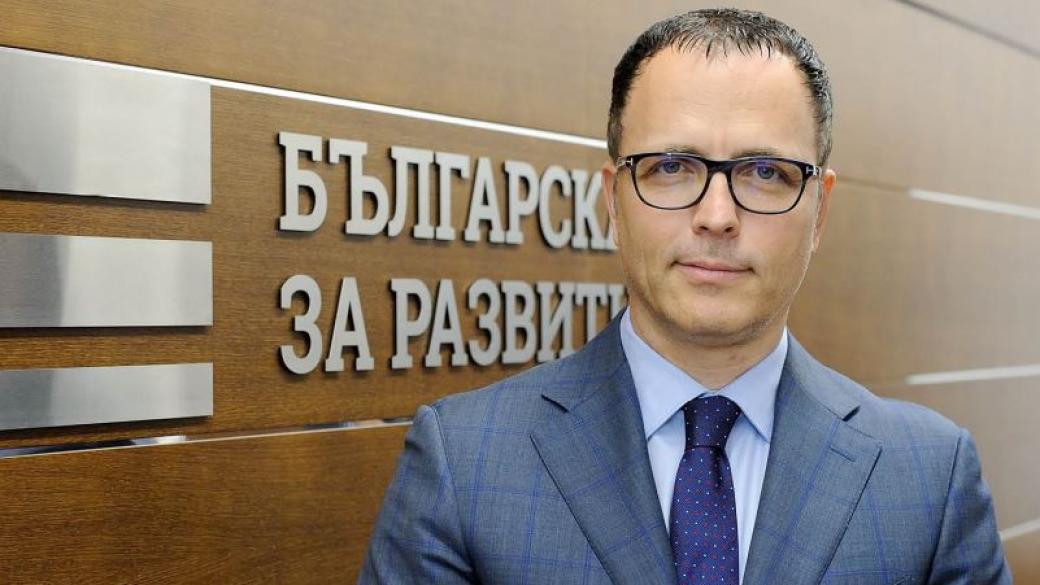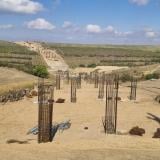Stoyan Mavrodiev: We Support Economic Growth and Innovation
The EUR 1.5 billion agreement with the China Development Bank is a milestone for the Bulgarian Development Bank, as well as for the banking sector in Bulgaria

Stoyan Mavrodiev has a Master degree in Law from Sofia University and a Master degree in Finance from the University of National and World Economy in Sofia. His qualifications include courses at the International Tax Academy in Amsterdam and the International Programme for Leaders at the US State Department. He started his career as legal, tax and business consultant at PricewaterhouseCoopers. During the period 1996-2006, Mr. Mavrodiev worked as a financial and legal consultant and managed United Consulting. From 2009 to 2010, he was the Deputy Chairman of the Commission of Economic Policy, Energy and Tourism and a member of the Budget and Finance Commission at the 41st National Assembly of the Republic of Bulgaria. For a period of 6 years (2010-2016), he was the Chairman of the Financial Supervision Commission (FSC), supervisor and regulator of the financial system and the non-banking financial sector in Bulgaria. From 2010 to 2016, he was a member of the Financial Stability Advisory Council (FSAC). During that period, he was also a member of the Board of Directors of a number of international organizations, among them: ESMA, EIOPA, ESRB, and a representative of Bulgaria in IOSCO, IАIS and IOPS.
Mr. Mavrodiev, one of the biggest banking news in Bulgaria this year was the EUR 1.5 billion financial agreement between BDB and the China Development Bank. What are the opportunities that it brings for the Bulgarian economy?
One of the prerequisites to succeed is to dream big. And then to act boldly. In our case, I can say that this really huge success is the result of both the exceptional partnership between BDB and CDB and our negotiations held for several months. Thus, we were able to attract EUR 1.5 billion for Bulgaria out of the EUR 2 billion provided by China to all CEE countries under the 16+1 initiative. Out of these funds, 75% will be allocated to Bulgaria and we are very proud that this achievement is the largest project of CDB within the China-CEE Inter-Bank Association.
Within this framework, we shall regularly define the financing needed to support the Bulgarian businesses and the Bulgarian economy. Furthermore, the interest rates are 1.5% lower compared to issuing a corporate bond instead. There are no transaction costs, which saved us EUR 30 million that will enable cheaper loans to be offered to SMEs.
Based on our successful cooperation with Chinese financial institutions, BDB could become a centre for investment banking enabling good projects, suspended or postponed up until now due to lack of funding, to be implemented. Therefore, BDB will be able to finance government infrastructure projects such as roads, railways, energy infrastructure, telecommunications, like other development banks do. In addition, CBD has an investment interest in co-financing major infrastructure and important national projects in Bulgaria in partnership with BDB. And yet, the main headline out of the funding secured by BDB is for the Bulgarian entrepreneurs: supporting start-ups, small and medium-sized enterprises, new technologies, agriculture, etc.
You personally have extensive experience in cooperating with the Chinese financial institutions, experience which you are currently expanding on as a CEO of BDB. What are your prospects for development of these relationships and where do you see new opportunities?
The results of the trade, economic and financial cooperation between China and the CEE countries within the One Belt One Road initiative speak for themselves. In 2017 for instance, the bilateral trade between China and the 16 CEE countries was worth USD 21.35 billion, showing a 20% increase y/y. An excellent example of an economic cooperation are the infrastructure connectivity projects, such as the bridge over the Danube in Belgrade, Steineri TPP in Bosnia and Herzegovina, the construction of a railway line between Hungary and Serbia. The economic benefits out of the initiatives such as One Belt, One Road will have their impact not only today, but also in 10, 20 or 50 years. Therefore, we must be pro-active and take advantage of these opportunities - or, as the Chinese say: “The wind does not help anyone who is not sailing anywhere.”
The successful cooperation with CDB, as well as the loan facilities with other Chinese financial institutions, such as China Exim Bank and the Industrial and Commercial Bank of China (ICBC), are of great significance to BDB. In 2017, BDB signed an EUR 80 million loan agreement with CDB for investment financing, along with an EUR 50 million loan facility with the Export Import Bank of China to finance Bulgarian businesses. We are currently negotiating another loan agreement with ICBC. Altogether these are solid financial resources to support the Bulgarian companies and boosting entrepreneurship.
Several months after taking up their office, the new Management Board of BDB presented strategic plans for funding of infrastructural projects. Would you say more about the new role that the bank may play in the implementation of the government's economic strategy?
In April 2018, our bank celebrated the 10th anniversary of the adoption of the BDB act and added a new emphasis to its activity, namely the implementation of the government's strategy for building a modern and connected regional infrastructure. This was the reason to organize the first major international forum of the Bank – “Infrastructure for Growth” to support the efforts in connecting the Balkans’ economies. The main purpose is to strengthen the ties between the EU and the Western Balkans. Better roads, railway network, gas and electricity connections - this will bring people together and attract the businesses. Both Bulgaria and the other countries in our region will gain a lot from the implementation of a strategic investment plan for infrastructure development and the connectivity between our producers and markets.
Financial institutions, and in particular development banks, are the factor that can assist the governments in the region to successfully implement their strategies by providing funding, guarantees or equity. Because everything that is built is lasting. At the BDB Forum in Sofia, we discussed the need of assessment and structuring of funding for an infrastructure programme, as well as the catalytic role of development banks during this process.
We signed a Memorandum of Understanding with the Croatian, Hungarian and Macedonian Development Banks, the Black Sea Trade and Development Bank and the International Investment Bank, and we started a conversation that will continue in the future concerning joint projects for ensuring better connectivity within the Balkans, enhancement of exports and innovation. The greatest benefit will stay with the entrepreneurs and small and medium-sized businesses. The more investments in Balkan connectivity are realized successfully, the more the economic potential of the region and each of our economies will expand, thus ensuring greater stability, security and development.
Under the BDB Act, the Bank's main mission is to support small and medium-sized enterprises. How is this strategy being implemented?
More than 3/4 of BDB's direct loans target the SME sector. Funding for small and medium-sized companies remains a key focus of the Bank's activities, and this cannot be any different; after all, they form a huge part of the business in Bulgaria. The challenges faced by small and medium businesses in Bulgaria are many, and yet we believe that their support will have a huge economic impact on the country.
We have recently introduced a new loan - direct funding under the Juncker Plan for micro, SMEs and mid-caps. As you know, BDB is the main partner in Bulgaria of the Investment Plan for Europe by not only providing resources to the business but also by providing project preparation advisory services. The plan is already yielding its first encouraging results in Europe, largely thanks to the strong involvement of national promotional banks and institutions. In terms of funds utilization under the Junker plan we rank third, but the Bulgarian Development Bank will continue to be an important partner within this European plan and a key element in the European investment programmes.
You certainly understand that given the dynamics of business development in Bulgaria, we aspire to meet its needs with new products, under better and more flexible conditions, lower interest rates and collateral requirements. We also work actively on several on-lending programs with commercial banks and non-bank financial institutions. As a development bank, our role is to be a partner, not a competitor to others, and we value our cooperation with them, because through their branch network we manage to reach even the smallest towns and villages.
Last but not least – the Bulgarian Development Bank is a financial group. It includes the Microfinance Institution “JOBS”, which supports only micro, small enterprises and start-ups, and the National Guarantee Fund, which issues guarantees supplementing the collateral of the SME sector, thus facilitating their access to financing and improving the loan conditions.
You have just mentioned
BDB’s subsidiaries - the National Guarantee Fund and MFI “Jobs”, are you
planning to expand their activities?
Through our subsidiaries, we have a unique role to play in supporting start-ups and entrepreneurs. To date, every fifth company, supported by, for example, MFI “Jobs” is a start-up. In addition to being very responsible and trustworthy clients, working with start-ups is extremely motivating since you become a part of the process of turning an idea into a working business. Among them, there are also many innovative companies; for instance, one of them has developed fire detection systems capturing smoke-free fire.
It is rewarding to see how the ideas and plans of people, even the most unusual ones, are being implemented - for example, to raise salmon thousands of kilometres away from the ocean at the foot of the Rila Mountains, to make a dream come true - to produce a Bulgarian ultra-light aircraft or to create a children’s clinic; as well as small, family undertakings - restaurateurs, hoteliers, designers, farmers who want to establish a business, open new jobs and grow.
The National Guarantee Fund is also proud of its excellent results. Recently, the company celebrated its 10th anniversary and reported over 7,600 supported companies, employing more than 120,000 people. Throughout this period, NGF has implemented 9 guarantee programmes in partnership with 18 commercial banks and the amount of the loans guaranteed by the Fund exceeds BGN 1.8 billion
Support for start-ups and innovations will obviously be a priority, both at European and national level. How will BDB fit into this trend?
Start-ups have always been our target and BDB is one of the few institutions that actually support emerging companies. Because, as you know, lots of discussions take place, and yet very few financial institutions take the risk of providing them with adequate to their needs financial resources and specific financial products.
That is why we are currently in the process of establishing a Capital Investment Fund as a subsidiary of BDB. It will invest in companies’ equity thus helping to speed up their business growth.
Uncertainty is perhaps the most appropriate word to describe the newly-established companies - will the entrepreneur find a quality team to progress with; how the market will accept it; will the entrepreneur be able to emerge and make the sales he plans. And this is one of the important missions of Bulgarian Development Bank - to improve the access of these companies to working capital or investments, to help them enter the international markets, to become part of their success.
Most of the entrepreneurs are not well prepared and need support before they become capable of being financed - to draw up a business plan, identify their users, manage their cash flows. Therefore, start-up training programmes are rather useful. For a second year now, BDB has been supporting the largest programme for training start-ups in Bulgaria - The Founders Institute, thanks to which many already successful start-ups have made their first steps.
After many years in finance, your professional career is still developing - from a financial sector regulator you have become a banker, and for a year now you have been a CEO of a bank. Can you summarize the results and intentions for the next year?
In short, in addition to the solid financial resources that we have attracted and which we have already mentioned, for the past year BDB has provided funding to Bulgarian business amounting to more than EUR 200 million.
The sectors in which the supported companies operate are rather diverse: air transport, green energy, construction of buildings and facilities, hotel and restaurant business, financial services, information technology and advertising, food production, machinery and equipment, agriculture, forestry and fisheries.
BDB is the bank with the highest equity capitalization in Bulgaria, excellent resilience to external shocks and with a stable rating increase due to continuous work improvement and development strategy. At the beginning of 2019, we will celebrate our 20th anniversary and I believe that the bank's next decade will start with a very successful year.















